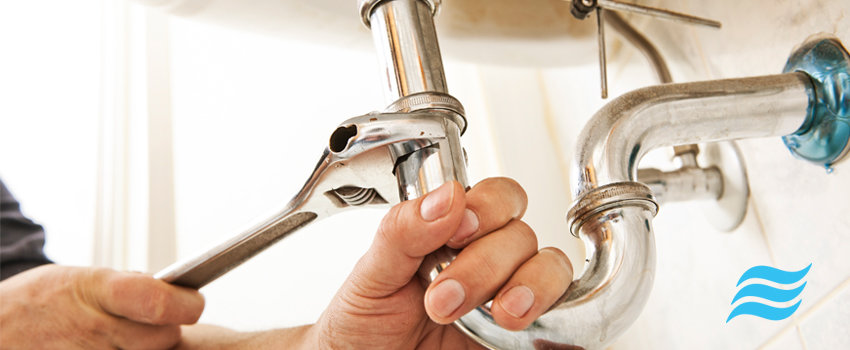
Drain Maintenance 101: Causes & Prevention
It’s very easy to take your drains for granted. When you’re cleaning or doing the dishes, if an item slips down the drain or even gets caught in the drain plug, it’s easier to let the item fall down the drain and forget about it. That is until that item causes a clog in your drain, or damages your pipes. This is why certain items go down the garbage disposer, or better yet, the garbage. If you don't plan on doing proper drain maintenance, you better know what not to put in your home's drain system.
Take the time to read through this article to learn how to do proper drain maintenance – you’ll save yourself the headache of troublesome clogs and expensive repairs.
Why is my drain clogged?
Over time, enough miscellaneous items will go down the drain, especially for shared bathrooms. Things like dead skin, dust, dirt and hair will make their way down the drain. Alone, these items will follow the flow of water through your plumbing system, however, soap scum and other gummy, adhesive substances can catch these smaller items that fall down the drain and create the potential for a stoppage.
Knowing how easily a clog can develop with just items that will naturally fall into the sink, you get a better picture of how important it is to avoid putting items that don’t belong in your pipes down the drain.
In terms of identifying what is causing your clog, it’s important to pay close attention to patterns. If you recognize that a certain sink tends to clog once a year or once every other year, that can tell you if a clog happens outside of that timeline, whether someone in the home may have put something down the drain that they shouldn’t have, or if a greater issue has occurred outside the home.
If you regularly clean your drains out after you notice drainage issues and do your due diligence in preventing clogs and you still notice slow draining, you’re likely dealing with a larger problem. If your main line is compromised, it’s only a matter of time before your entire system experiences a major backup. This could be due to a combination of larger items throughout time meeting at your main line, but the most frequent cause of mainline clogs is tree roots. If you’re noticing regular clogs, despite taking proper preventative measures, you’d best call a plumber immediately to troubleshoot your system and remediate any mainline blockages right away.
What can’t I put down my drain?
Whether you are rinsing dishes or going through your daily morning prep, it can be easy to have items fall down into your drain. Just because these items fit into the drain, doesn’t mean that they will navigate your winding pipes without becoming lodged and creating a clog. If you avoid having enough of these foods and other substances fall down your drains, you’ll prolong your plumbing system and avoid pesky drainage issues.
Foods that should never go down the drain
- Oil and grease – These fattier substances can be slippery, but when cooled down, they quickly turn into a solid glob that catches on to other food and waste items poured down the drain.
- Flour – Flour is obviously a small and compact substance, however, once it gets wet, it becomes a more solid, sticky substance. Unless you never run the faucet again, you’re going to produce a gummy substance if you put flour down your drain.
- Eggshells – Eggshells are tough but also porous, so that makes them an unideal item to go down your drain. This means that the stiff shell pieces can get caught on smaller blockages but will also grab ahold of other items that fall down the drain.
- Coffee grounds – Coffee grounds can stick together when wet.
- Pasta and rice – These items may seem small, but they are full of starch which, when wet, becomes very gooey and can easily cause a clog in your drain.
- Seeds and nuts – Smaller items alone may not have issues navigating your pipes with help from water, however, your pipes aren’t always perfectly cleared. This means that these little seeds can add up and create big problems for your plumbing system
- Bones – Bones take a long time to break down and larger bones can easily damage even the best of disposal systems.
Other products that can’t be put down your drain
- Paper products – This can include paper towels, tissues, face wipes and toilet paper. While these products can break down somewhat when in contact with water, but these products don’t break down quickly and some aren’t completely biodegradable. Paper products are large in relation to a drain and can quickly create a substantial clog.
- Plastics – This can be food stickers or floss. All plastic is bad for the environment because it is not biodegradable. This means that if a piece of plastic gets caught in your pipes, no amount of time passing is making it go anywhere without a plumber stopping by to dig it out.
- Tampons and pads – As these are paper products, they will take a long time to decompose. Both are also designed to expand much larger than any pipe.
- Flammable or combustible substances – These dangerous substances can have a serious reaction to the numerous toxic gases that are in the sewer lines.
- Corrosive liquids – No matter how much water you use to flush damaging liquids down, they will have a lasting effect on your pipes, which can add up to major costs.
Ultimately, the health and performance of your drains – sinks, tubs, and showers – depends upon how you care for them. Be proactive and preventative, and teach your family to do the same, so that you don’t incur the major costs of a major clog. See our post on “to flush or not to flush” for bathroom drain tips. If you do find yourself with a clog – or have other questions about your drain performance – contact Nichols & Phipps today!
Check out our other blogs for some great plumbing advice:
-
- How to unclog a blocked toilet
- 5 helpful tips for troublesome toilets
- Is it Time to Replace Your Toilet?
- To Flush or NOT to Flush?
- Plumbing Tricks and Insider Tips of the Trade
- What is the Best Type of Water Heater to Use in Northern Virginia?
- Plumbing Noises and What They Mean
- The 6 Fundamentals of Bathroom Remodeling
- Dropped it Down the Drain… Now What?
- The Water Heater Dilemma – Repair or Replace?
